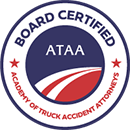What Causes Truck Driver Fatigue?
Fatigue among commercial vehicle (CMV) drivers is among the leading causes of large truck accidents, as reported by the Federal Motor Carrier Safety Administration (FMCSA). But what causes truck driver fatigue, and what can the industry do to foster a safer environment for everyone on the road?
In This Blog, We’ll Answer Questions Like…
- Why is truck driver fatigue so dangerous?
- What are the main causes of fatigue among professional drivers?
- What actions can the industry take to limit exhaustion in its CDL drivers?
The Dangers of Fatigue Among Big Rig Drivers
When transporting a fully loaded trailer, the average commercial truck can weigh as much as 80,000 pounds. By comparison, a smaller passenger vehicle may only average 4,100 pounds, although weight can vary depending on the size of the vehicle.
In a collision between a tractor-trailer and a passenger car, the truck will exert significantly more force on the other involved vehicle.
When someone is tired, drowsy, or fatigued, they will experience:
- Impaired cognitive thinking
- Delayed response times
- Lower mental and physical performance
These are all vital for safely driving a large and powerful vehicle like a semi-truck. A fatigued truck driver will be less likely to notice and react to stopped vehicles, speeding drivers, traffic signs, and other potential risks. And if they do notice, their ability to slow down, brake, or take evasive action will also be greatly lessened.
And not only does driving while fatigued or drowsy increase the chances of an accident, but it also increases the potential severity. Since a tired driver is less likely to react in a timely manner, accidents involving high speeds are more likely to occur.
The Top 5 Causes of Truck Driver Fatigue
Fatigue is a known problem in the trucking and transportation industry. To better understand the ways in which being tired or exhausted behind the wheel can pose a danger to other motorists, let’s explore the five most common causes of fatigue among drivers with commercial drivers licenses (CDLs).
Extended Work Hours
Hours of service (HOS) regulations as set by the FMCSA are intended to limit the number of hours that a trucker spends behind the wheel. However, the average trucker still spends a significant amount of time on duty.
For example, after only a 10-hour break, drivers can spend up to 11 hours driving in a single shift.
A trucker’s job doesn’t begin and end with the turn of the ignition, though. These drivers must also perform necessary pre- and post-drive inspections, among other work requirements on top of driving responsibilities. A driver may have already put in several hours of work before they even get a chance to buckle up.
Strenuous Work Schedules
Every shipper and motor carrier within the transportation industry should be intimately familiar with HOS regulations for drivers. Despite this, many companies continue to create and enforce unreasonable delivery schedules.
This forces drivers to either comply with dangerous schedules to maintain their employment, or abide by current regulations and risk losing their source of income.
Substance Abuse
With long working hours, unreasonable delivery schedules, and pressure from employers, some truckers turn to substances as a way to cope. This isn’t a small problem, either—and it’s only getting worse.
According to data from the FMCSA, there were 53,514 positive drug tests among truck drivers in 2020. By 2022, that number had skyrocketed to 68,639 positive results. In descending order, the following 14 drugs were most commonly identified:
- Marijuana
- Cocaine
- Methamphetamine
- Amphetamine
- Oxymorphone
- Oxycodone
- Hydrocodone
- Hydromorphone
- Morphine
- Codeine
- 6-Acetylmorphine
- Phencyclidine
- Ecstasy (MDMA)
- Methylenedioxyamphetamine (MDA)
Drugs and alcohol alter brain functioning and can cause fatigue. Truck drivers are strictly prohibited from ingesting these substances before or during duty hours. However, there is a path for drivers with past violations to return to work. As of Jan. 2023, there were 166,296 active drivers with at least one prior substance violation.
Monotany of Driving
Traveling to a new place can be fun and exciting. But when you’ve been seated behind a wheel for hours on end looking at a mostly unchanging landscape, it can very quickly become monotonous and boring.
Long drives are known to cause drowsiness and sleepiness. This is because of a phenomenon known as task-related fatigue, which can cause fatigue when a driver is either under- or over-stimulated.
Unhealthy Lifestyles
The trucking industry relies on drivers committing the majority of their waking hours to the task of driving and transporting goods. This leaves little opportunity for these individuals to spend time on their physical and mental health.
Drivers may skip meals or lose out on sleep to meet delivery schedules. Without access to cooking appliances, most rely on fast food or preserved snacks. And spending hours and hours behind the wheel means that most truckers aren’t getting in enough physical activity. Information from Mayo Clinic shows that sitting for long periods of time has been associated with several severe health problems, including high blood pressure, high levels of unhealthy cholesterol, and high blood sugar. All of this can contribute to feelings of fatigue.
Combating Fatigue, Drowsiness, & Sleepiness Behind the Wheel
Leaders in the trucking industry can take a stand against fatigue among drivers by improving working conditions. Fewer driving hours and more reasonable delivery schedules are two small steps toward creating a safer roadway for everyone in Oregon.
Drivers can also decrease their likelihood of behind-the-wheel fatigue by taking driving breaks, getting regular movement, eating healthy meals, and avoiding alcohol and drugs.
Finding Justice for Accident Victims Across Oregon
Trucking Injury Law Group is solely dedicated to fighting for the rights of truck accident victims. If you believe that a truck driver’s fatigue caused or contributed to your accident, you need to take action fast to preserve evidence and improve the possible outcome of your claim.
A team of expert Portland truck accident attorneys is standing by to help. Call or fill out our convenient online form to schedule your no-cost, no-obligation case consultation.






